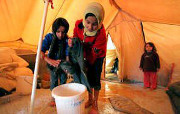Nigeria (MNN) — A weekend argument over a soccer field in Nigeria exploded into a free-for-all of violence between Muslims and Christians.
There are differing news accounts of what happened, but most accounts agree that a Muslim and a Christian quarreled with each other on the field on February 23 in Wukari, northern Taraba State. Open Doors Minister-at-large Paul Estabrooks explains what happened next. "Essentially, the Muslim young person was able to get his hands on a gun, and he shot the young Christian that he was arguing with, which then started a whole conflict between the team and everyone around."
Within minutes, the fight spiraled out of control. Estabrooks says various news accounts describe absolute mayhem. "The violence extended into the village and the town: 300 homes were burned. It's just incredible violence that occurred there that makes you shudder!"
Police say at the end, five people were dead, although the toll is expected to rise. As of Monday, the casualty list ranged from 20 to 30 victims. Aside from the loss of homes, places of worship also sustained damage.
The explosion of violence unnerved authorities, and Estabrooks notes that it took very little to tip the scales after a Boko Haram attack on a Christian family in Abuja just two days prior. "It just shows us how deep the religious tensions are in that part of the world. It doesn't take much."
In that attack, military and government reports confirm that Muslim attackers used machetes and guns to murder 10 members of the same Christian family in Plateau state, with half of the victims under the age of six.
The incident also highlights concerns that the violence won't be contained in the north. "What distresses me," says Estabrooks, "is that it's the young people of northern Nigeria who are the most restless about the violence and about the issues that the two religious groups face."
What's more, the messages young people are hearing from their leaders are mixed, adding to the tension and confusion. Estabrooks explains: on the one hand, "there is one church leader in Nigeria who has a lot of influence, who says to the young people, ‘Jesus taught non-violence. We cannot respond to violence with violence. It's just not the biblical pattern.'"
On the other hand, "you have another leader who has possibly more influence with young people there who tells them, ‘We have turned the other cheek so many times, we have no more cheeks to turn. So it's time to take up arms and deal with this issue!'
"The whole area is just pulsing with antagonism to one another. It seems to me that it has to be even more than just religious differences." Estabrooks asks if there is a winner in this contest for the youth. "Being young and being very emotional when these things happen, you get this kind of conflict that's horrifying as the ultimate outcome."
The future is what's at stake, and the youth have a lot of energy that needs direction. Government efforts to protect Christians haven't been reassuring since the attacks continue. Much of the violence is blamed on the sect Boko Haram, whose name in Hausa means "Western education is sin." Their stated goals are to create an Islamic state, instill Sharia Law, and eradicate Christianity.
Estabrooks says Christians in Nigeria need prayer for wisdom and grace. "We really need to pray for our brothers and sisters who live in that area of such high tensions, and that God would give them the ability to be peacemakers rather than respond to every little insult and let it erupt into violence that will just about destroy an entire community."
The Gospel message runs counter to the tit-for-tat that disintegrated into a melee Saturday. Estabrooks explains, "Jesus' teaching is a very attractive teaching to people of peace, love, and the ‘putting others before yourself.' But if we don't live it as Christians, no one else is going to accept it because they don't see it in reality."

